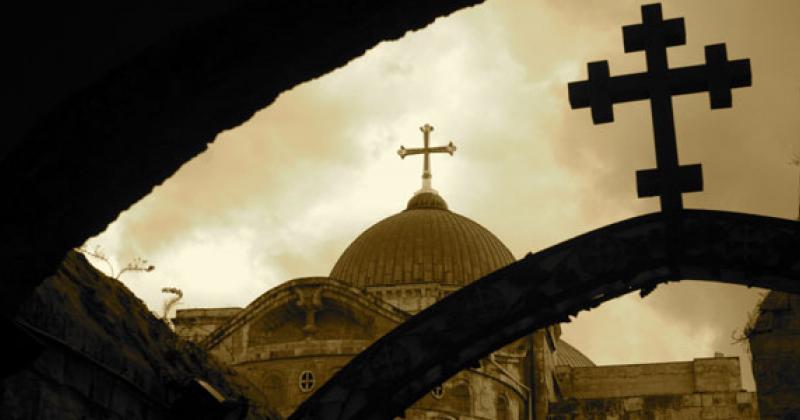Before the Arab Spring started, Majda Ayoub, a Christian Jordanian, decided to leave the US, where she was raised and educated, and settle down in her homeland.
The situation was very risky for Christians in Iraq, then in Egypt and Syria. But as Jordan has always been an “oasis of stability and security”, the idea of leaving out of fear for her and her family’s safety did not cross her mind at first, not before she saw Islamists take to the streets in unprecedented numbers, emboldened by victories of their peers in Egypt, Tunisia and Morocco.
The bloody attacks against churches in Iraq and Syria sowed fear among other members of the Christian community in Jordan and many of them migrated, mostly to the West, driven by that fear and other socio-economic factors.
They were wrong to think that way, say both Muslim and Christian leaders, and intellectuals. Not in Jordan.
These individuals, aware of the fact that the acceleration of Christian migration would negatively change society’s make-up and culture, are mulling ways to lure Christian expatriates to return home through promoting the Kingdom’s image as a safe environment and a country on the right track for prosperity.
The call, yet to be institutionalised, came to remind Christians abroad that life in their country is a matter of identity and contribution to the area’s deep-rooted culture that is threatened by extremism.
Regardless of the reasons that sent Christians looking for a better life in exile, their numbers have dropped significantly, according to estimates.
President of the Evangelical Church Council of Jordan Imad Maaya put the percentage of Christians in a total population of about 7 million at around 2 per cent, down from 3.5 per cent a decade ago.
Head of the Central Orthodox Council in Jordan and Palestine Raouf Abu Jaber gives a near figure, adding that in the early 20th century, Christians constituted 20 per cent of the area’s residents.
MP Jamil Nimri said that a number of factors accelerated the withdrawal of Christians from the region, among which were Ottoman policies that sent the number of Christians in the region dwindling dramatically.
The rise of jihadism in the region is another factor that is still spreading fear among Christians.
The Israeli occupation of Palestine and the ensuing decades-old Arab-Israeli conflict have contributed to the phenomenon, according to Ramzi Twal.
Born in Jerusalem and originally from Madaba, Twal, 48, immigrated to Canada in the early 1970s.
In an e-mail interview, he said that his father was pushing him to stay where he was, pending an end to the Arab-Israeli conflict, which the father, in 1974, saw imminent.
Now after 40 years of a prosperous life in exile, he misses “even the sound of azan from the mosque in our old Madaba neighbourhood”.
But returning to Jordan would be a big compromise, due to the numerous privileges in living as a Canadian citizen.
He also wants a Jordan that is transformed into a modern corruption-free state of law and order.
Nimri agreed.
He said that the number of Christians and other Jordanians looking for a better life abroad would increase until “security and citizenship are truly established” and when the rhetoric of hatred promoted by extremists in Jordan ends.
“Having a more democratic, civil country is the answer to many problems. Only through success in this and working for the common good, can we encourage those who migrated to return and feel secure again.”
King’s Special Adviser Ali Fazza points out that Jordan remains a model of coexistence and Muslim-Christian harmony.
He told The Jordan Times in a recent interview that the waves of terrorism that the Arab world faced was not against a certain minority, but against moderation.
“Christians and Muslims have lived thousands of years together in harmony; the recent violence against Christians is not rooted in Islamic society, but in the perception some radicals hold, wrongly blaming the Orient’s Christians for the West’s oppressive policies,” Fazza explained.
Considering the volume of migration, Fazza warns that if the phenomenon continues, it will eventually empty the land of Christians, “who played a key role in shaping Arab culture, science and education. It will be a great loss”.
Fazza said that there should be open channels of communication with Christian expatriates, encouraging them to participate one way or another in building their society as they have done, even before Muslims arrived in the Levant.
Promoting interfaith dialogue is a vital means to counter extremism as the common enemy of Islam and Christianity, he said.
Royal Institute Interfaith Studies Director Micheal Hamarneh told The Jordan Times that understanding the causes of migration is crucial in order to encourage Christians to migrate back home.
He said that security, equality and true citizenship are attractive elements.
“Real progress comes when genuine economic and social reforms are achieved,” according to Hamarneh.
He said that by attracting Christian immigrants back, society will benefit from their experiences in all walks of life, and thus springs the need to create jobs, and sometimes to “even tailor jobs for them”.
Hamarneh suggested holding a workshop to discuss ideas that might help stop migration and encourage those who left Jordan to return.
Abu Jaber told The Jordan Times that, apart from once-and-for-good return, encouraging Christian investors to invest in Jordan would be of great benefit to the country. A special organisation could be established to communicate with these potential investors, he suggested.
Maaya said the effort could be triggered by inviting 150-200 Christian families to stay for a week in their respective governorates and meet with key figures who would introduce to them the “Jordan of today”.
Majda Maaya will not be waiting for an invitation. She will likely make her second comeback, along with husband and children, within a year, after she finishes her PhD.
